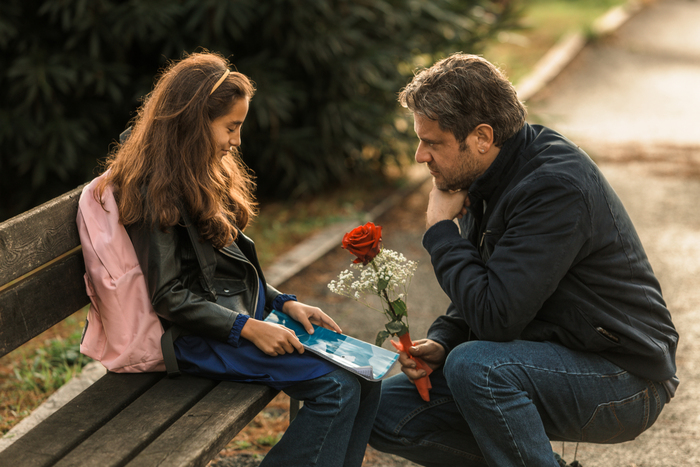A story "on which Alessio and I were able to give a personal point of view. It's something we've both experienced, being separated dads. It came naturally to us to tell it. And it's a topic that is still talked about too little".
Fabrizio Moro says this about his second directorial work, Tuesday and Friday, written and directed, like his debut Ghiaccio (2022) together with Alessio De Leonardis.
The protagonist is Edoardo Pesce, in the role of a separated father who sees his life falling apart.
With him in the cast, among others, Rosa Diletta Rossi, Giorgio Caputo, Aurora Menenti, Adamo Dionisi, Pier Giorgio Bellocchio and Mirko Frezza.
Produced by Francesca Verdini (La Casa Rossa) with Rai Cinema in co-production with Rs Productions and Pepito Produzioni, in association with Urban Vision, the film will arrive in theaters from 22 February distributed by Medusa.
"We are in a historical moment in which there is rightly a lot of talk about how women must be protected in a system that is still patriarchal - adds the singer-songwriter and director -. At the same time, attention should also be paid to the condition of many separated fathers. Because we two we were able to find an economic balance with our ex-partners and our children but there are some fathers, known to me personally, who sometimes go to eat at Caritas".
We follow in the story Marino (Pesce), a mechanic, recently separated from his wife Simona (Rossi) and with visits to his daughter Claudia (Menenti) scheduled for two days a week, Tuesday and Friday.
Due to old unpaid taxes, the mechanic is forced to close his workshop: economic problems and difficulties in finding a new job push him to join the criminal gang of a friend, Cioccolatino (Caputo), acting as a driver for robberies to supermarkets.
A secret life that he manages to manage, until they offer the gang a big score.
"In Ghiaccio we told a story of social redemption, here there is a father who tries to stay afloat and unfortunately he gets the measurements of the armrests wrong and little by little he sinks to the bottom - observes De Leonardis, born in 1982, who in his career was also assistant and director and assistant director for authors such as Krzysztof Zanussi, Daniele Vicari, Paolo and Vittorio Taviani, Gabriele Mainetti -. However, I hope that the film brings hope".
Pesce allowed himself to be guided "by Alessio and Fabrizio, in giving a face to a good character, but still a bit of a child who doesn't fully take his responsibilities. It's interesting to start from a crisis situation like his and follow the path he takes."
The element that "I would like to emerge is that a father and a mother must not go to war with each other, we must think first of all about the children - adds Moro -. And here in fact the wife is not described as an enemy but as a woman who cannot cope does more and makes a decision."
Simona "has a more responsible point of view - explains Rosa Diletta Rossi -. She decides on the separation with the aim of improving her and her daughter's living conditions, so as not to be in constant conflict. At the same time, there is between her and Marino a relationship of great respect and dignity".
However, "you must always tell a child the truth - underlines De Leonardis - and you must prepare him for the different life that separation brings, which should not be dramatised".
"I needed this parallel path as a director - explains Moro -. I was in a moment in which I had given so much to music and music had given so much to me but I felt too much stress in being 'on the front line'. Keeping up with the camera, gave me the opportunity to pay more attention to Fabrizio, not to Fabrizio Moro, to express my interiority more without the chaos of the mainstream musical world".
By working together "we have found our method - add the two directors, who already have the idea for a third film -. We decide everything together but we give ourselves separate tasks".
Reproduction reserved © Copyright ANSA

